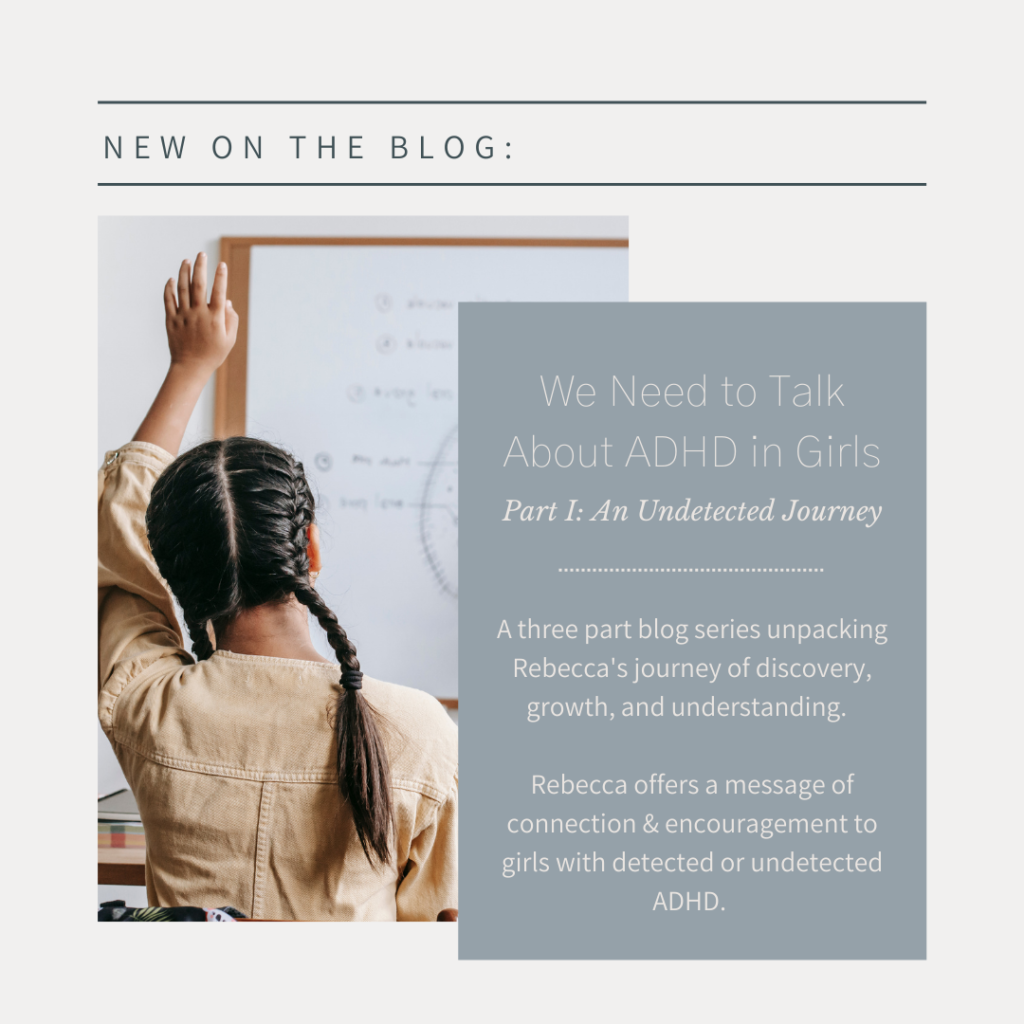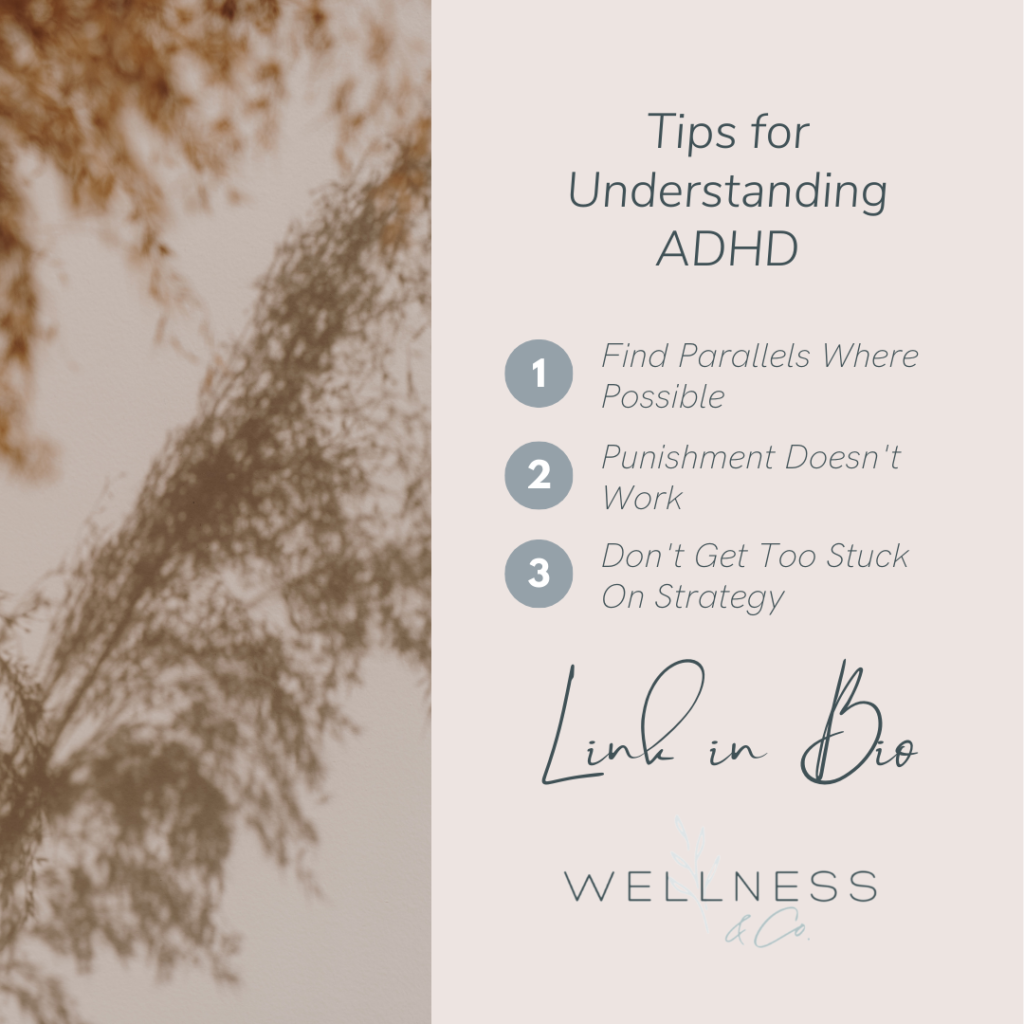Follow
Wellness & Co.
Hi, I'm Dr. K, Wellness & Co. is a growing therapy/coaching practice and educational hub for prospective clients based in Maryland and virtual clients all over the world!
Hi, I'm Dr. K
free guide
e -books
e -course
We Need To Talk About ADHD In Girls
October 8, 2024
Part I: An Undetected Journey
By: Rebecca Horch, BACYC, CPC

My Story – “Earth to Rebecca!”
My 5th grade teacher used to yell this across the classroom when I would zone out during math lessons. I would snap out of whatever imaginative world I had entered and, embarrassed, pick up my pencil to doodle, at least pretending to look like I was working.
During a parent teacher interview one time I overheard my teacher saying “Rebecca has a lot of potential, if she would only stop to focus! She can be such a space cadet sometimes.”
This memory is one that started a story I began to create about myself as a young girl. It set a stage for the narrative of who I told myself I was for years to come. I know now that the intention was harmless, but for me, the impact was huge.
My lived experience of being a woman with ADHD has affected every part of my life. It has informed huge personal and professional decisions I’ve made through the years and it is truly part of my identity.
Over the next 3 weeks we’ll be taking a deeper dive into understanding ADHD. Each week you’ll be invited in with some personal stories from my own journey. And together, we’ll head a layer deeper, learning more about the experience of ADHD in women and how best to support ourselves and those we love. Look for the following format to get the most out of your reading:
- My story
- Your Daughter
- Tips for Understanding ADHD
Let’s get started!

Remember What My Teacher Called Me?
Space Cadet. This became my new nickname. Any time I fumbled on my words, forgot to grab my jacket, lost my pencil case, or couldn’t sit all the way through a movie. “Oh, that’s just Rebecca. She can be kind of a space cadet.”
As I made my way through the rest of primary school and into middle school, I would often spend hours at a time sitting out in the hallway.
“Rebecca, you are a bright kid, but you need to stop talking out of turn in class.”
“Rebecca, I have asked you to pay attention multiple times now. Why don’t you just go sit outside the classroom since you aren’t listening anyway.”
“Rebecca, stop doodling.”
“Rebecca, I answered that question already. Pay attention!”
“Rebecca, please stop asking so many questions. It’s disturbing the whole class.”
“Rebecca! Quit being a smart Alek”
“Rebecca, pay attention!”
After reading about a kid who was constantly reprimanded through school, you might expect me to say next that I struggled academically, that I fell into the wrong crowd and got into all kinds of trouble. But the truth? I was bright. I got mostly As and Bs all through school, and other than a few social blunders here and there, I was generally a pretty well-behaved kid. The problem was there was a lot more going on under the surface than I let on and I managed to find ways to “mask” the underlying anxiety I felt constantly. I had incredibly low frustration tolerance, and perfectionistic tendencies that certainly helped me in my school work, but simply aided to cause me harm in other areas of my life.
Does this sound like you or your daughter? If so, you’re not alone. We can walk this journey together…below you’ll find some insights and tips for understanding you or your daughter even better. If you want more information, support, or practical steps on how to support your child.
Your Daughter – The Early Signs of ADHD
I have been interested in Attention Deficit Hyperactivity Disorder, otherwise known as ADHD, for many years. As a coach and counselor who has spent the majority of my career working with youth, I have come across this diagnosis hundreds of times. I have spent time and money learning all about a neurodivergence that seemed to not have a clear cut answer, while creating programs for youth and families to try and support them through the confusion of it all.
I didn’t know why I was so drawn to ADHD in particular until my early 30s when my daughter was diagnosed with it, and subsequently, I was diagnosed as well. I soon realized the reason why I seemed to connect with adhd as a professional is because I understand it from a personal level.
Although doctors had suspected this since adolescence, I had never had a formal diagnosis until I began to recognize the signs in my own daughter. It didn’t matter that I had worked with so many families who had children with adhd, I still didn’t come to terms with it myself until I had a child who was clearly struggling.
I soon realized there were reasons why I was so naive to this diagnosis even though I had been working with it for years, and one of them is because I’m a woman. Most of the youth I’ve worked with over the years with an ADHD diagnosis were male, and their presenting symptoms were very different from what I experienced growing up.
Educating people about adhd, particularly in girls, has now become a passion of mine, and I often start that teaching by sharing my own story.

An Honest Check In
So before we end for today, let me ask you this about your daughter (or did you see any of this in yourself as a young child):
- Does your daughter do well at school, and then come home at the end of the day and “melt down” to a point where she’s inconsolable?
- Does your daughter frequently tend to daze off or daydream while being instructed with a task? Or do you find her wandering off in her daydreams in the middle of an activity?
- Does your daughter have a hard time completing a task that has just been given to her? And do the reminders you give seem to only make things worse, or cause more anxiety?
- Does your daughter seem to talk as if her voice is driven by an engine, and needs frequent reminders to “calm down,” “lower her voice,” or “let others speak”?
- Does your daughter get very upset with herself when she cannot complete a task “perfectly” and end up giving up entirely?
- Is your daughter sensitive to or get very distracted by: bright lights, loud noises, or uncomfortable physical sensations such as tags in the back of her shirt?
These are all early signs of a neurodivergent brain. Yes, these are also signs of other challenges such as anxiety, autism spectrum disorder, or simply their temperament too. This is part of the reason why ADHD can be so tricky to diagnose in young girls. It is simply not clear cut.
Continue to follow along over the next couple of weeks to hear the rest of my story and how I am now passionate about educating and supporting other families experiencing similar challenges. There is so much hope and beauty in the ADHD brain that is a gift to this world! In the meantime, here are some quick tips for you to chew on!…

Tips for Understanding ADHD
If you are someone who knows a young girl or a woman in your life who has ADHD or you suspect has ADHD and you want to know some practical ways you can support them right now here is some basic education & strategies:
Tip One – Find parallels where possible
How do you relate to the person in front of you? Connect with them based on your own lived experience. If you’ve had experiences in the past where you had a hard time maintaining focus or finishing projects, use these experiences as ways to connect.
Tip Two – Punishment doesn’t work
Punishment and shame are not great motivators for humans already but especially with people who have ADHD, it can be counteractive. Punishment produces shame, which in turn can influence the person to continue “undesirable” behavior as a sort of “self fulfilling prophecy.” You may very likely hear something like “well, I’m just going to get in trouble anyway so….”
Tip Three – Don’t get too stuck on a strategy
You may find that one particular routine or strategy seems to work really well and then suddenly it doesn’t. This is normal. Try not to be discouraged but just start searching for other ways to stimulate that motivation center, and encourage them to find ways for themselves to build some responsibility and agency.
– Rebecca
Rebecca strives to support others in building resilience, self-compassion, connected relationships and self-awareness. She loves to work with people who are ready for the hard work of inner growth and is passionate about helping others tap into their intuitive gifts and use them in this world.
Leave a Reply Cancel reply
CONTACT
Start Here
BLOG
OUR TEAM
SHOP
ABOUT
©2025 Wellness & Co. | All Rights Reserved | Design by EverMint Design Studio
BACK TO TOP
connect with us on instagram
